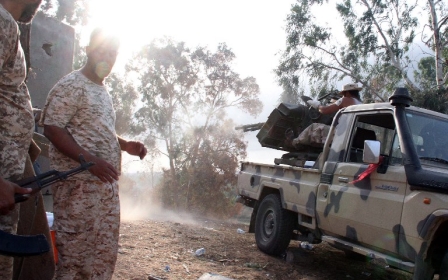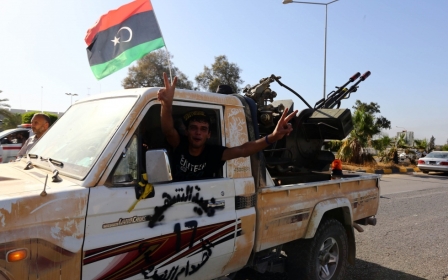Libya Dawn takes upper hand in civil war, as regional powers intervene

Revelations that the UAE and Egypt have carried out air strikes in Tripoli indicate the forces of Libya Dawn are gaining the upper hand over Khalifa Haftar and his supporters, according to analysts who have said what was a regional proxy war has now become a hot conflict.
Four American officials said mysterious air strikes that killed at least 17 Libyans in Tripoli on 17 and 23 August, targeting Misratan and Islamist fighters battling for the capital’s airport, were carried out by UAE warplanes launched from airbases in Egypt.
“We don’t see this as constructive at all,” one of the unnamed officials told the New York Times.
The Egyptians have dismissed the reports as false while the Emiratis said they have “no reaction” to the allegations. Libya’s ambassador to the UN Ibrahim Dabbashi told Reuters on Monday he doesn’t believe the claims of foreign intervention. The US State Department refused to publicly comment on the leaked report.
The leak, however, has confirmed rumours of Emirati and Egyptian intervention for many and led commentators to brand their air strikes a failure.
“Militarily speaking these strikes were another failure,” said Mattia Toaldo, policy fellow at the European Council on Foreign Relations. “The bombings happened on Saturday [23 August] and by the evening the Misratan militias had captured the airport.”
“The rationale behind the strikes was likely that the airport was the main lifeline for the Zintanis in terms of armaments and refilling their arsenals. By taking the airport the Misratans have eliminated one of the main weapons supply hubs for their opponents.”
Others have gone further and suggested that the UAE acted in desperation to try and prop up their clients in Libya who appear to be losing the battle for control of the country.
“Recent events suggest the Libyan Shield, which seems to be fighting to protect Libya’s independence, is winning on the ground,” said Christopher Davidson, reader in Middle East politics and author of After the Sheikhs: the Coming Collapse of the Gulf Monarchies. “This is perhaps why the Emirates has lashed out in this way. When more evidence is made available it will likely show huge amounts of Emirati cash has been supplied to the Zintanis.”
“The counter-counterrevolution seems to be winning and that would explain this desperate act by the UAE.”
The UAE, along with Saudi Arabia and Egypt, oppose what they view as the dangerous rise of political Islam since revolutions swept across the Middle East in 2011. Others, including Davidson, view their attempts to roll back the changes of the past three years as a ploy to entrench authoritarianism in the region.
On the other side of what has been labelled a proxy war, Qatar and Turkey have overtly supported groups including the Muslim Brotherhood, controversially projecting themselves as seeking to support the democratic aspirations rooted among the uprisings.
Fighting to protect the 2011 revolution?
In Libya, battles across the country have pitched the forces of Libya Dawn versus those of Khalifa Haftar. Many have characterised it as a war between Islamists and nationalists, however, revelations of foreign intervention have fuelled a narrative that Libya Dawn is in fact fighting to protect the 2011 revolution.
“This leak has confirmed the Misratan militia’s narrative,” said Toaldo. “It feeds into the idea that the Misratan and Islamist side is not so much fighting in the name of Islamism, but rather it is battling in the name of the revolution against the allies of the former Gaddafi regime and foreign intervention in Libya.”
“There will no doubt be the perception that the Emiratis have carried out these attacks because there are former members of the regime based in the UAE.”
While the Libya Dawn forces now control the capital, as well as Benghazi in the east, the recently elected House of Representatives have sent their foreign minister to Cairo to seek help. Talks regarding regional intervention are continuing on Tuesday, after the old parliament, the General National Congress (GNC), announced it would be reconvening in Tripoli to “save the country”.
Although battle lines are being drawn by Libya Dawn, seeking to project the conflict as a war between revolutionaries and authoritarianism, some commentators have suggested the reality is quite different and rooted in personal interests.
“If it is the case that the House of Representatives is siding with Zintan and Haftar’s forces, calling the Misratan fighters terrorists, then this will simply exacerbate divisions,” Anas El Gomati, founder and director of the Sadeq Institute, Libya’s first public policy think tank based in Tripoli. “The GNC sides with the Misratan militias, as it feels they can get protection from them.”
“Both sides appear to be in the control of militias and neither are serving the needs and democratic aspirations of the Libyan people.”
Gomati explained that as the Libya Dawn forces are projecting themselves as protecting the revolution from Haftar’s Operation Dignity, they must be held to high moral standards.
“The Misratans are claiming to be fighting in the name of the revolution and that means they have higher moral aspirations than Haftar, who is well known as being pro-Gaddafi,” he said. “In that sense they require a heightened amount of scrutiny.”
“Libya Dawn, which is a reactionary military force, has to come up to speed on some basic principles. Most Libyans want to see an advancement of their democratic aspirations underpinned by the principle of participation in government and civil oversight of the military and security forces.”
The opportunity is certainly there for Libya Dawn, who now not only hold military power, but are also winning support among the Libyan public.
“Support for Libya Dawn has swelled after the parliament in Tobruk voted in favour of foreign intervention, as many felt this would undermine the 2011 revolution,” said the ECFR’s Toaldo. “We will see more cities and more tribes tilting towards them after news of the UAE and Egyptian strikes, as it feeds into that narrative of opposing foreign meddling in Libya.”
“The trend in the past month has been more cities and towns siding with Libya Dawn. The tide has turned against Haftar.”
Proxy war turned hot conflict
While there appears to be an opportunity for Libya Dawn to gain ground both militarily and politically, the emerging civil war is now clearly not just a matter for Libyans. Rumours of a proxy war pitching Saudi Arabia, the UAE and Egypt against Qatar and Turkey have now become a hot conflict, at least for Abu Dhabi and Cairo.
The Qataris and Turks have long been accused of supporting Libya Dawn with weapons and money, although there has been no hard evidence given to support these allegations. It has been claimed Doha founded the powerful February 17 brigade, which is now fighting Haftar’s forces in Benghazi, and provided jets for the 2011 Nato intervention that brought about the fall of Gaddafi.
Some have speculated about whether Qatar will now enter the conflict directly, as the UAE appears to have done, although Gulf experts have been swift to dismiss the idea.
“Qatar is aware of the risk of engaging directly in a hot conflict, as a small wealthy state,” said Durham University’s Davidson. “I don’t think they will make the same kind of gamble that Abu Dhabi has made.”
“Getting involved in a hot conflict will disturb the protection umbrella these states enjoy from the US and it also exposes them to potentially grave blowback.”
Davidson explained that for the UAE, being involved in directly attacking another country marks a watershed moment in its short history since independence in 1971.
“This is incredibly significant, as it is the first hard evidence of the UAE shifting from proxy to engaging in a hot conflict for the first time in its history,” he said. “There is now a leadership in place that has abandoned the UAE’s historic foreign policy pillars, which under Sheikh Zayed [the country’s first president] involved being carefully realistic about the small wealthy country’s position in the regional system.”
As for Libyans, their country has become a battleground for a war between wealthy regional powers seeking to pursue wildly conflicting agendas. The consequences continue to prove deadly. Since Libya Dawn forces seized control of much of the capital on Saturday nearly 150 houses have been reported burnt in Tripoli as well as the premises of a local television channel.
Divisions rack a country lacking effective institutions but that now possesses two parliaments. The UN Security Council will meet on Wednesday to discuss the crisis and many Libyans, analysts said, will be hoping a prospective resolution can provide an implementable plan that will lead to reconciliation and put an end to an emerging civil war.
Stay informed with MEE's newsletters
Sign up to get the latest alerts, insights and analysis, starting with Turkey Unpacked
Middle East Eye delivers independent and unrivalled coverage and analysis of the Middle East, North Africa and beyond. To learn more about republishing this content and the associated fees, please fill out this form. More about MEE can be found here.




